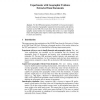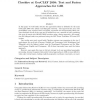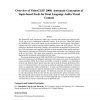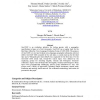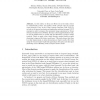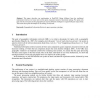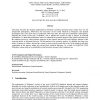105
Voted
CLEF
2008
Springer
15 years 4 months ago
2008
Springer
Abstract. For the 2008 participation at GeoCLEF, we focused on improving the extraction of geographic signatures from documents and optimising their use for GIR. The results show t...
108
Voted
CLEF
2008
Springer
15 years 4 months ago
2008
Springer
This article compares eight different diversity methods: 3 based on visual information, 1 based on date information, 3 adapted to each topic based on location and visual informatio...
121
Voted
CLEF
2008
Springer
15 years 4 months ago
2008
Springer
In this paper we will briefly describe the approaches taken by Berkeley for the main GeoCLEF 2008 tasks (Mono and Bilingual retrieval). The approach this year used probabilistic t...
148
Voted
CLEF
2008
Springer
15 years 4 months ago
2008
Springer
The VideoCLEF track, introduced in 2008, aims to develop and evaluate tasks related to analysis of and access to multilingual multimedia content. In its first year, VideoCLEF pilo...
146
Voted
CLEF
2008
Springer
15 years 4 months ago
2008
Springer
GeoCLEF is an evaluation initiative for testing queries with a geographic specification in large set of text documents. GeoCLEF ran a regular track for the third time within the C...
105
Voted
CLEF
2008
Springer
15 years 4 months ago
2008
Springer
This report is about our participation in the Answer Validation Exercise (AVE2008). Our system casts the AVE task into a Recognizing Textual Entailment (RTE) problem and uses an ex...
126
Voted
CLEF
2008
Springer
15 years 4 months ago
2008
Springer
In this article, we focus our efforts (i) on the study of how to automatically extract and exploit visual concepts and (ii) on fast visual diversity. First, in the Visual Concept D...
116
Voted
CLEF
2008
Springer
15 years 4 months ago
2008
Springer
Metasearch engines submit the user query to several underlying search engines and then merge their retrieved results to generate a single list that is more effective to the users&...
114
Voted
CLEF
2008
Springer
15 years 4 months ago
2008
Springer
This paper describes our participation in GeoCLEF. Being different from the traditional information retrieval, we focus more on the query expansion instead of document ranking. We ...
93
Voted
CLEF
2008
Springer
15 years 4 months ago
2008
Springer
